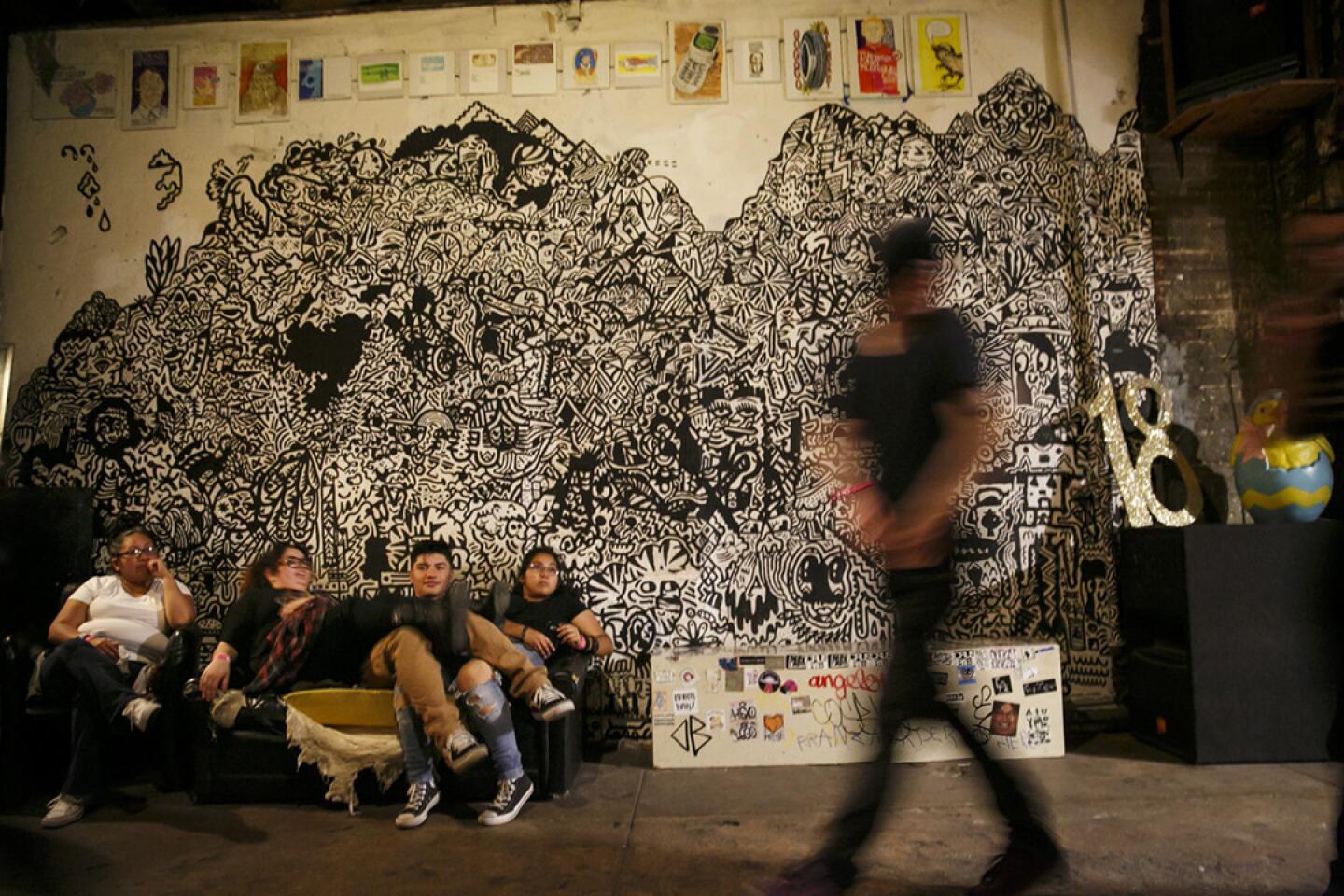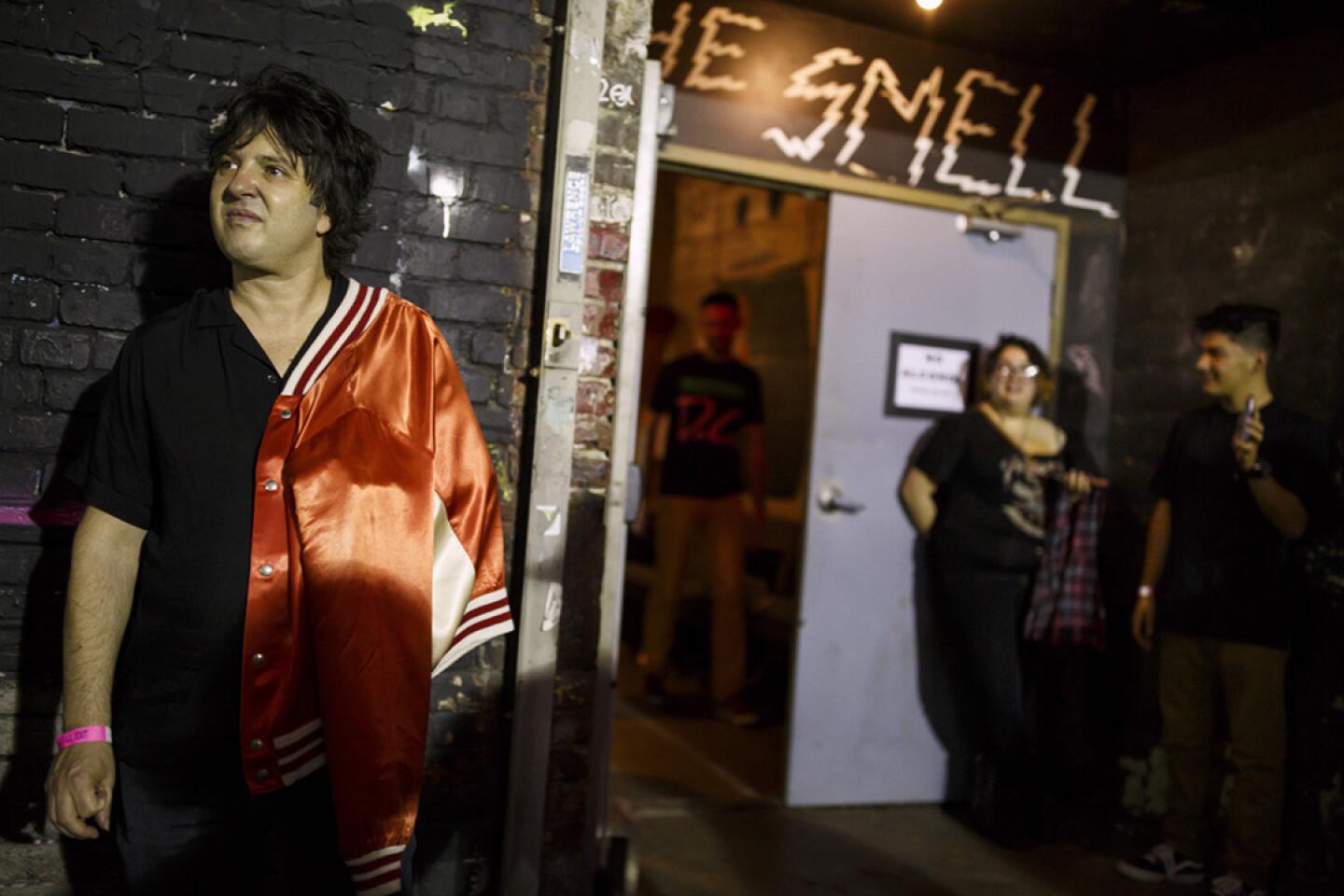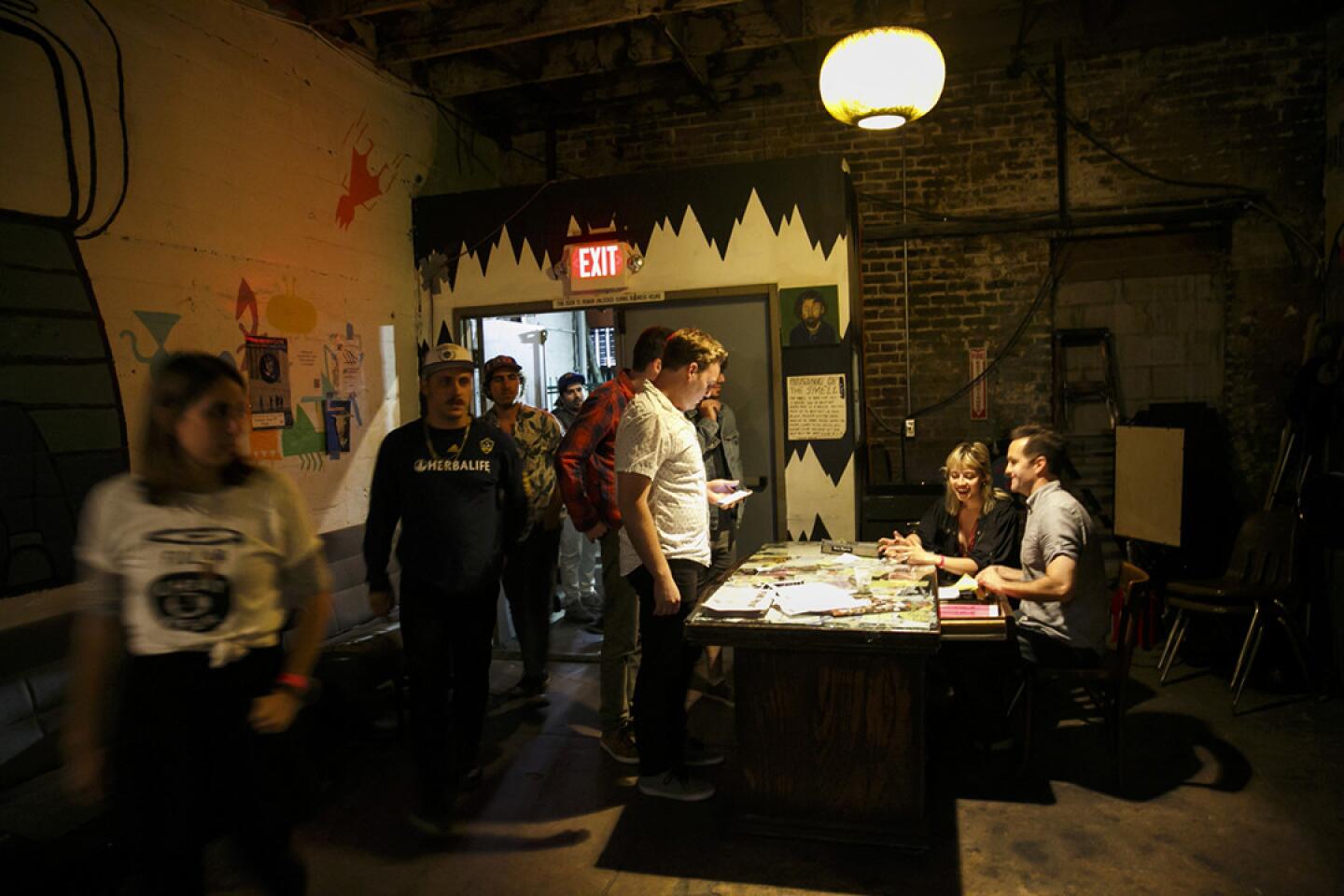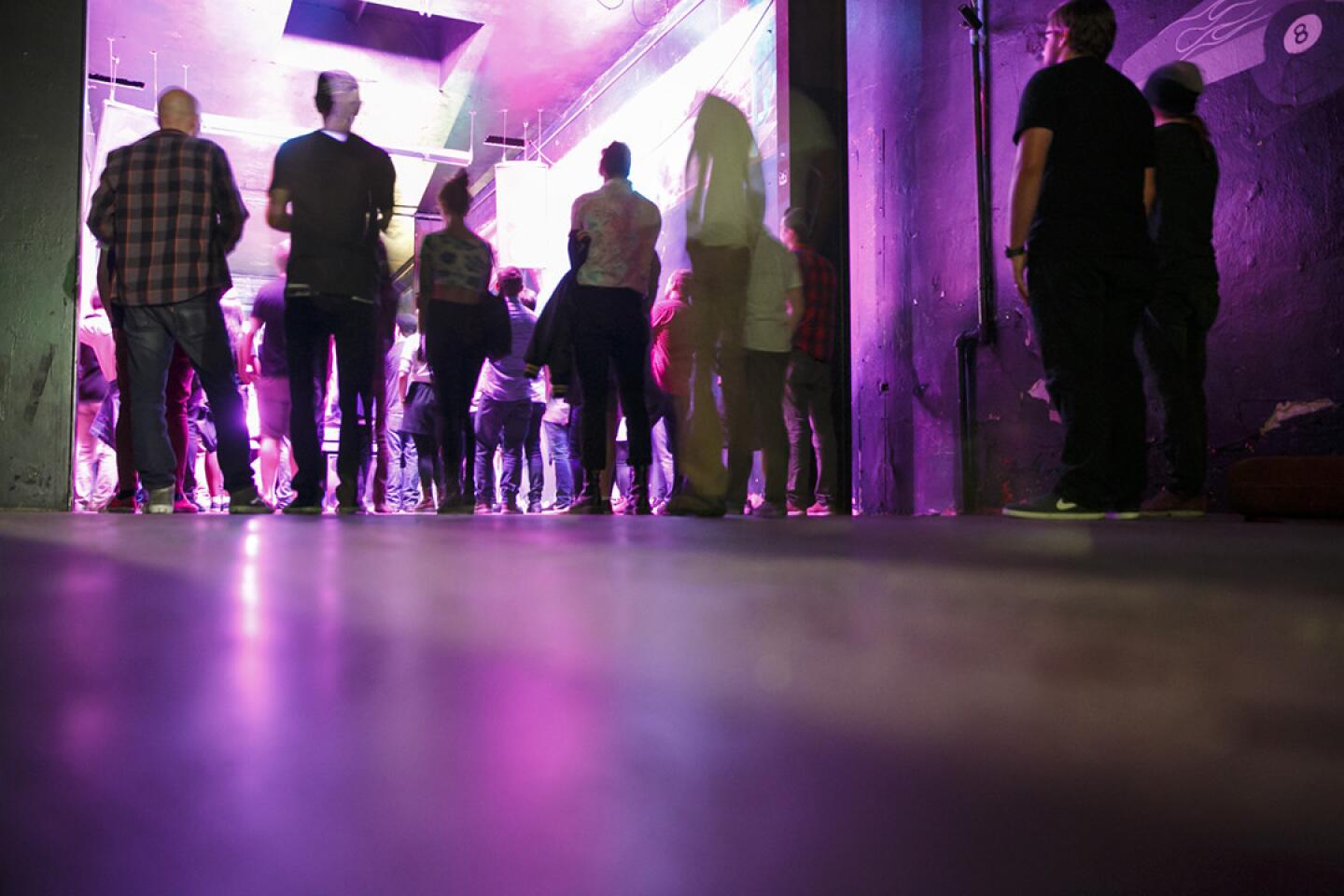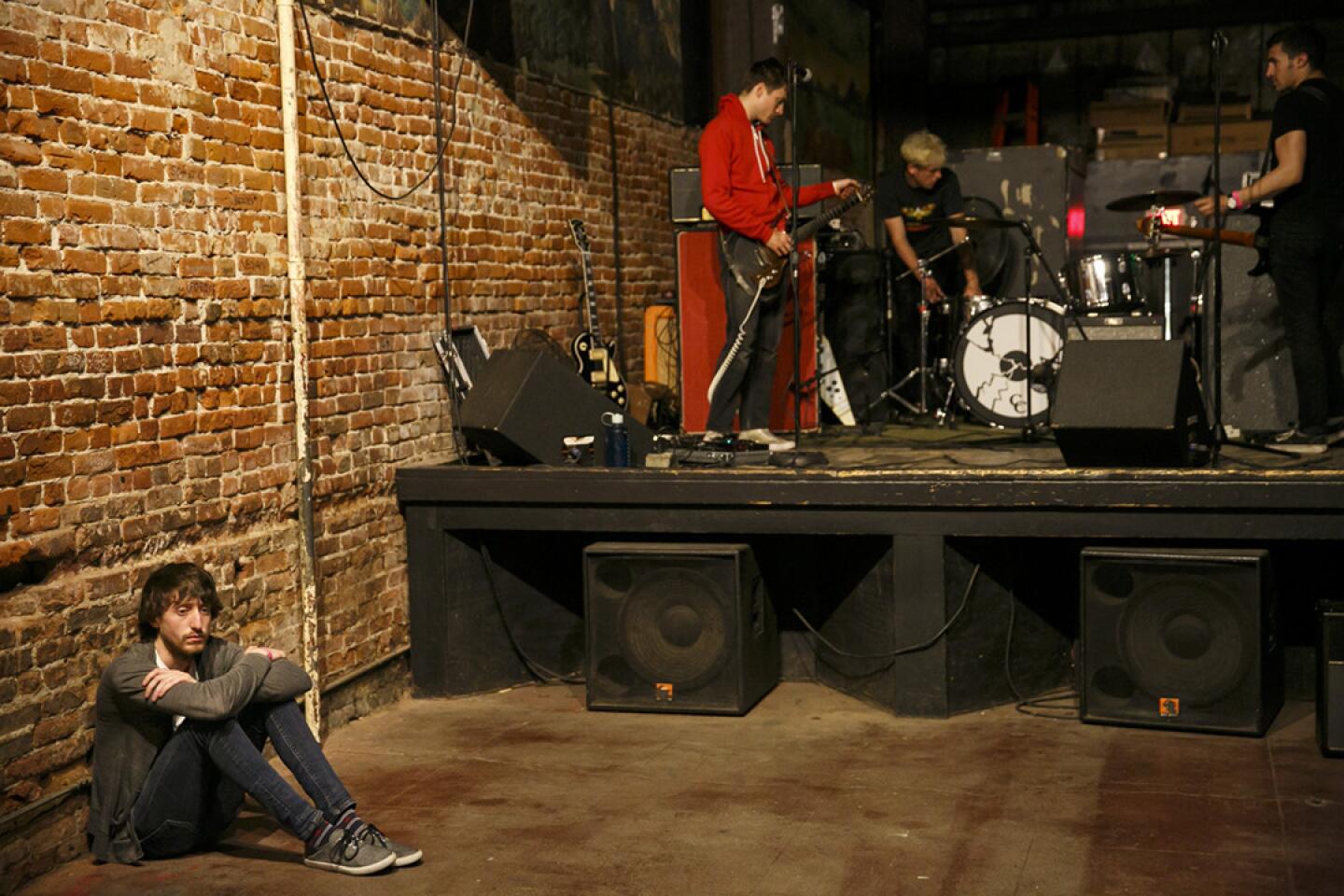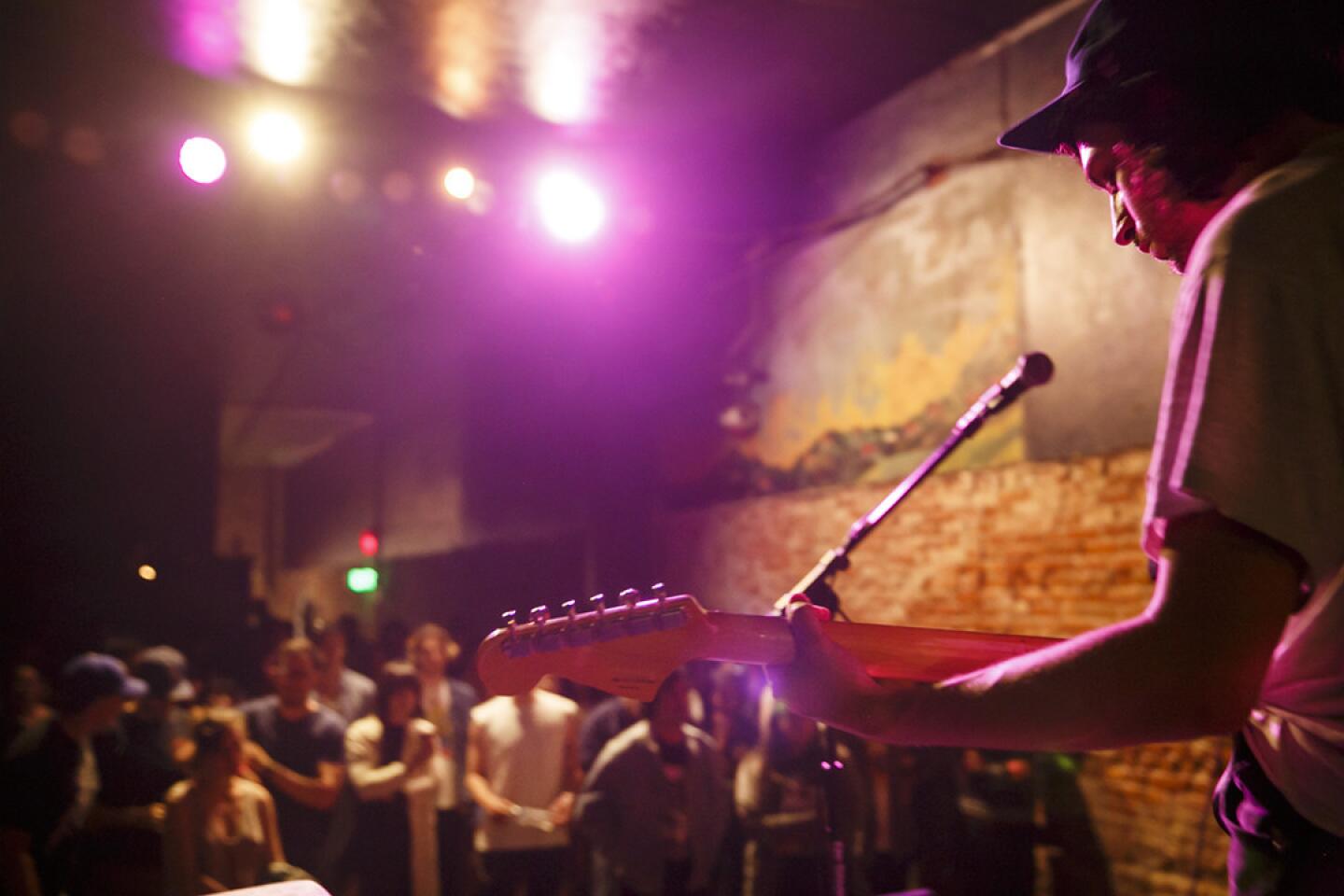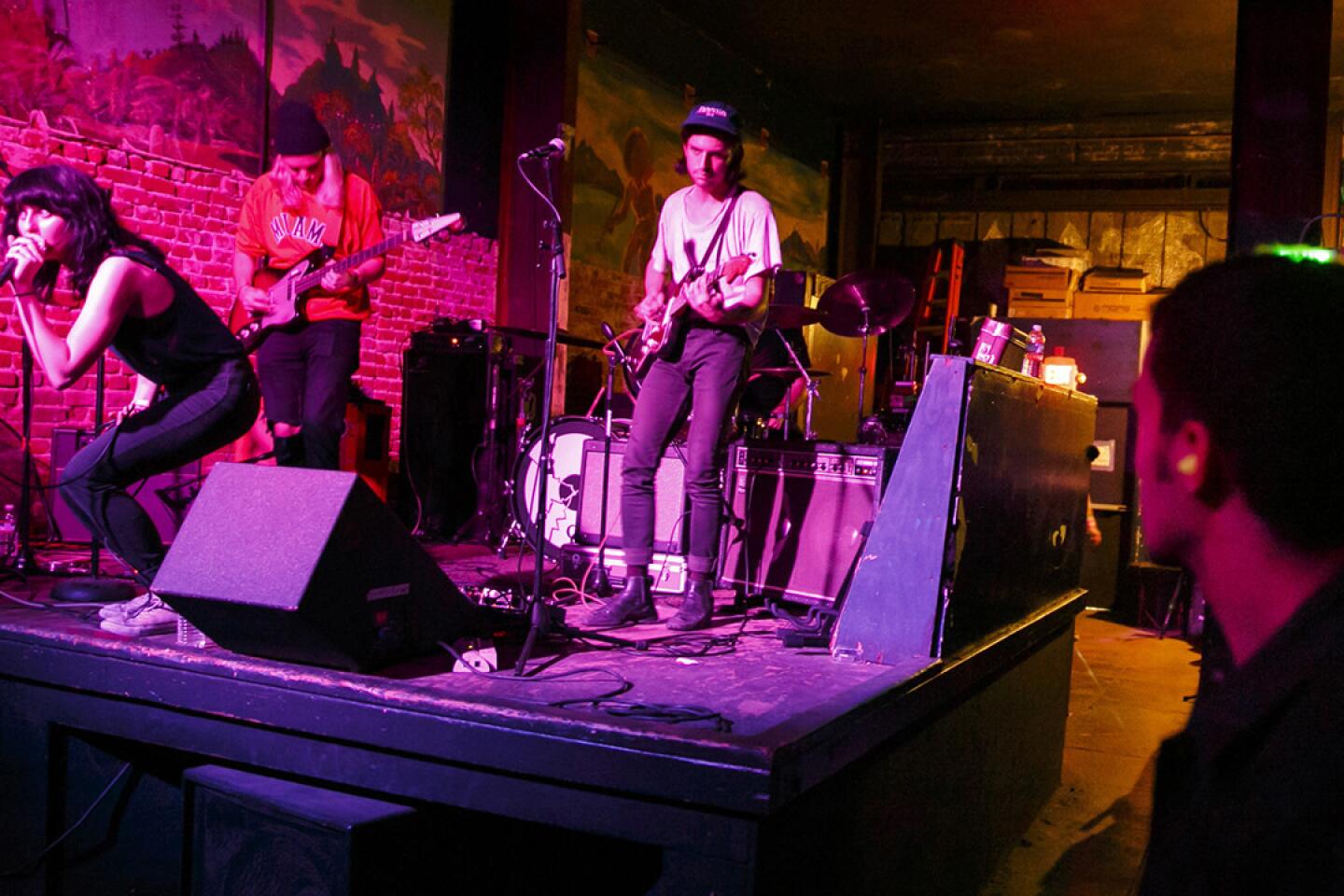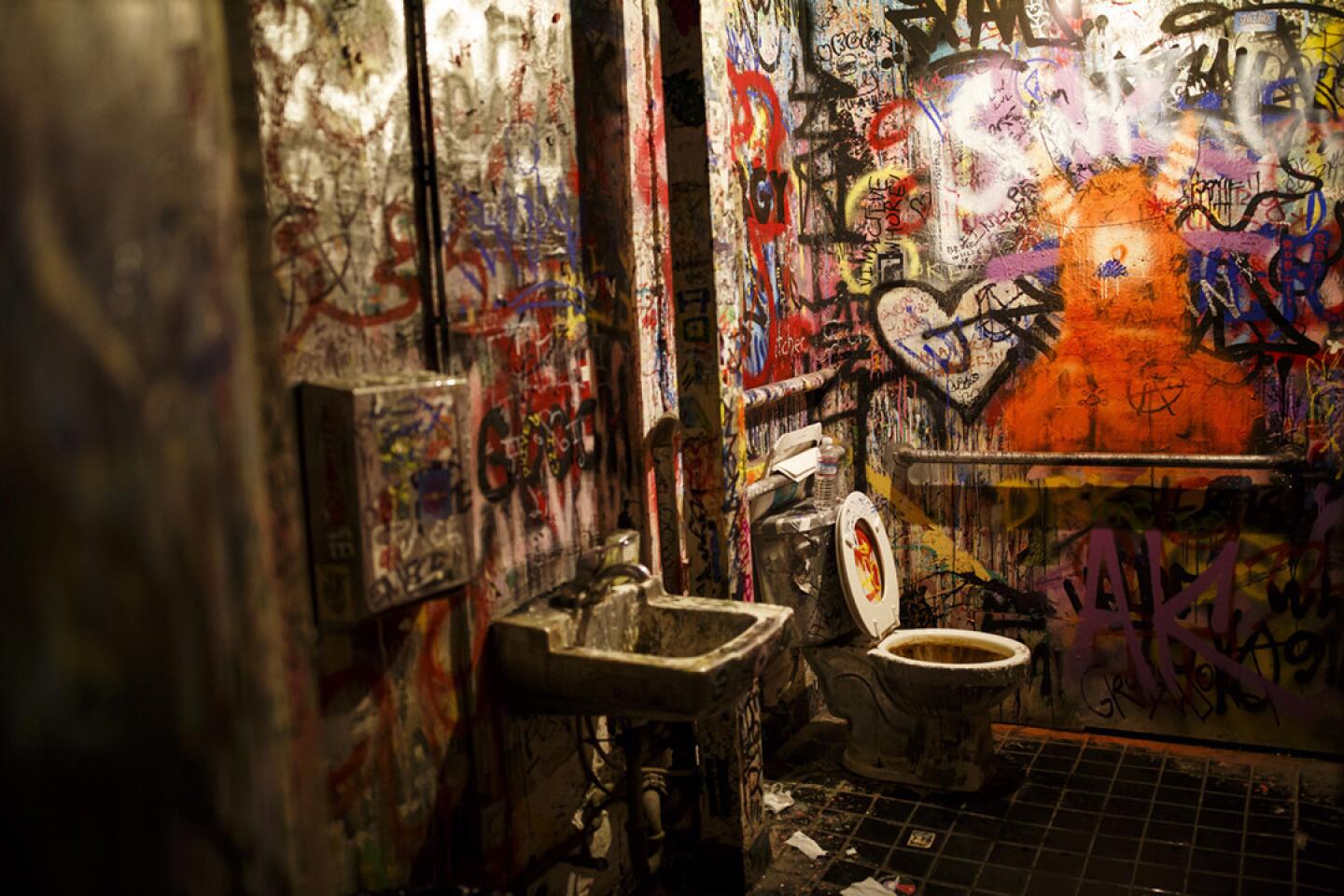With the Smell’s future uncertain, L.A.’s music scene could be altered
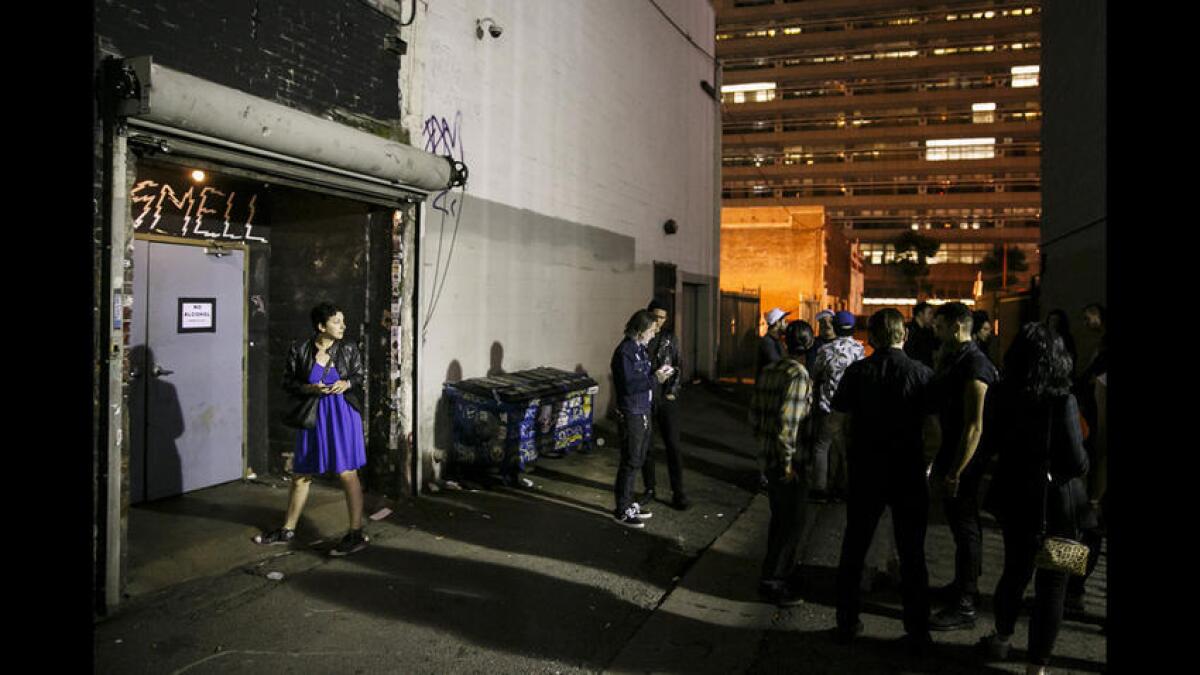
- Share via
No Age guitarist Randy Randall was getting ready to bathe his toddler son when bad news arrived via a text message. The future of downtown all-ages punk club the Smell was in jeopardy. “Be here at 7 to hear what’s happening,” it read.
“It was like the bat signal — ‘Well, I gotta go to the Smell,’” Randall told his wife.
She understood. They first met each other at the Smell, which since its birth in the late 1990s has thrived as a kind of secret headquarters for wayward young musicians, artists and fans.
The problem? The Smell’s owner, Jim Smith, needed help. His landlord, L&R Group of Companies, out of the blue had posted a demolition permit on the entrance to his club on South Main Street.
The same notice was affixed to two other cultural hubs, the Downtown Independent movie theater and the New Jalisco Bar, a long-running gay dance club.
No Age and a host of other influential local acts including Health, Best Coast, Bleached, Ty Segall and Abe Vigoda (the band, not the actor) might not have earned fan bases — or even existed — without the venue.
Even though its 130-person capacity makes it feel smaller than a dressing room at the Forum, an entire underground Los Angeles sound, one born of high-end distortion, staticky noise and speed-fueled energy, jelled within the Smell’s jagged brick walls.
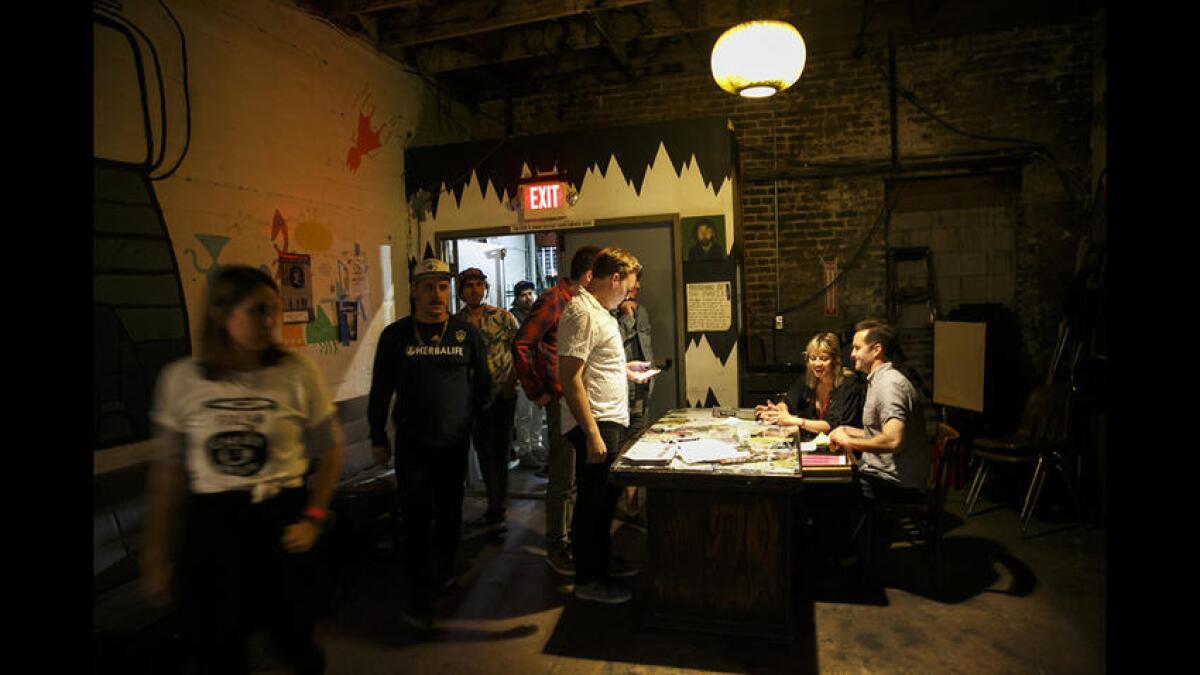
The Smell’s do-it-yourself philosophy has earned it a reputation akin to that of the fabled CBGB in New York, 924 Gilman Street in Berkeley and the long-shuttered ‘90s L.A. punk club Jabberjaw: A music space where commerce takes a back seat to extreme self-expression, where novice artists can build audiences from scratch.
And now its long-term future is in doubt.
A few days after Smith learned of the demolition permit, he spoke with Kevin Litwin, chief operating officer for Joe’s Parking, part of the L&R Group of Companies that owns the properties. Smith said that L&R acknowledged that it could have been better about communicating its plans, and stressed that there is no current plan for demolition.
In an email to The Times, Litwin wrote, “As a fellow lover of music, I appreciate the history of the Smell and its impact on the music community.”
The executive pledged to provide the Smell with “ample time” if the company decides to develop the properties. “If we’re able to help, we will.”
Smith, however, said that L&R hasn’t yet been willing to put it in writing.
The Smell’s lease remains month-to-month and, according to Smith, Litwin was unable to give him a definite time frame.
Smith explained that the nature of his business, booking shows for touring bands, requires more permanence.
“We can’t operate on vague reassurances,” Smith said. “We can’t just leave bands in limbo if we find out 30 days from now we’re going to get evicted or the building will be demolished.”
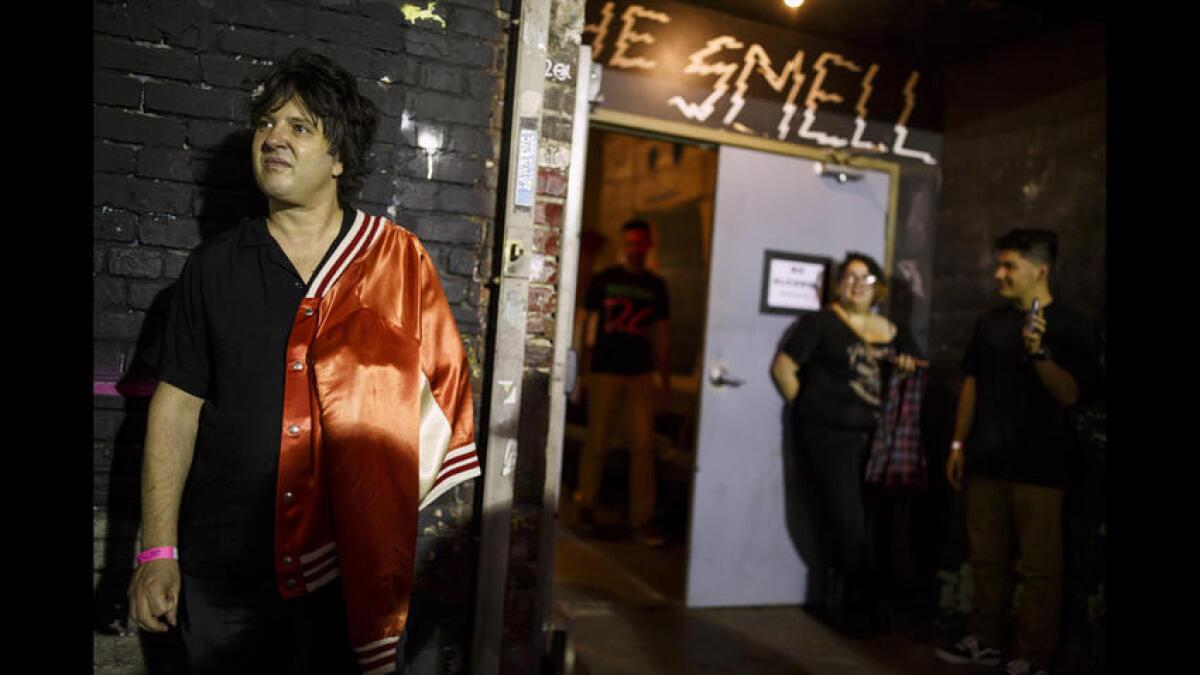
Smith, after speaking with No Age’s Randall and other members of the local music community, has developed a plan of action. He is seeking $1.4 million via crowdfunding site GoFundMe to finance the purchase of a building to house a new location.
About $17,000 had been raised by Friday afternoon.
Yet however well-intended the rescue effort, is there still room for an all-ages, no-booze rock club in downtown L.A.? The area surrounding the Smell is hardly as gritty as it used to be. There are arguably more Ubers than skaters these days.
The news didn’t surprise Jake Duzsik of Health, a beat-heavy noise rock band that earned early success through the club and now records for the respected indie label Loma Vista.
“Driving by and seeing the CrossFit gym and all the lofts and all the swanky restaurants, you’d say kind of callously, well maybe it’s not long for this world,” Duzsik said.
Smith, who looks more like an algebra teacher than a punk rocker, isn’t as fatalistic. That’s his nature.
Despite having a day job as an organizer and political coordinator for the local Teamsters union, most show nights — about 10 per month — he’s at the Smell to greet the bands and unlock the door.
His altruism is legendary. When Health was looking to record its first album, the band members wanted to capture the sound they heard when playing at the Smell. Smith gave them the keys to the place. “We recorded our entire record there, and he never asked for a dollar from us,” said Duzsik.
That sort of DIY philosophy helped build early Los Angeles clubs like the Vex, the Masque and Jabberjaw, each run by kindred spirits looking for a place to set up amps and go for it.
The Smell, born by Smith and two friends in North Hollywood in 1998, was built to stand on those shoulders, said Smith.
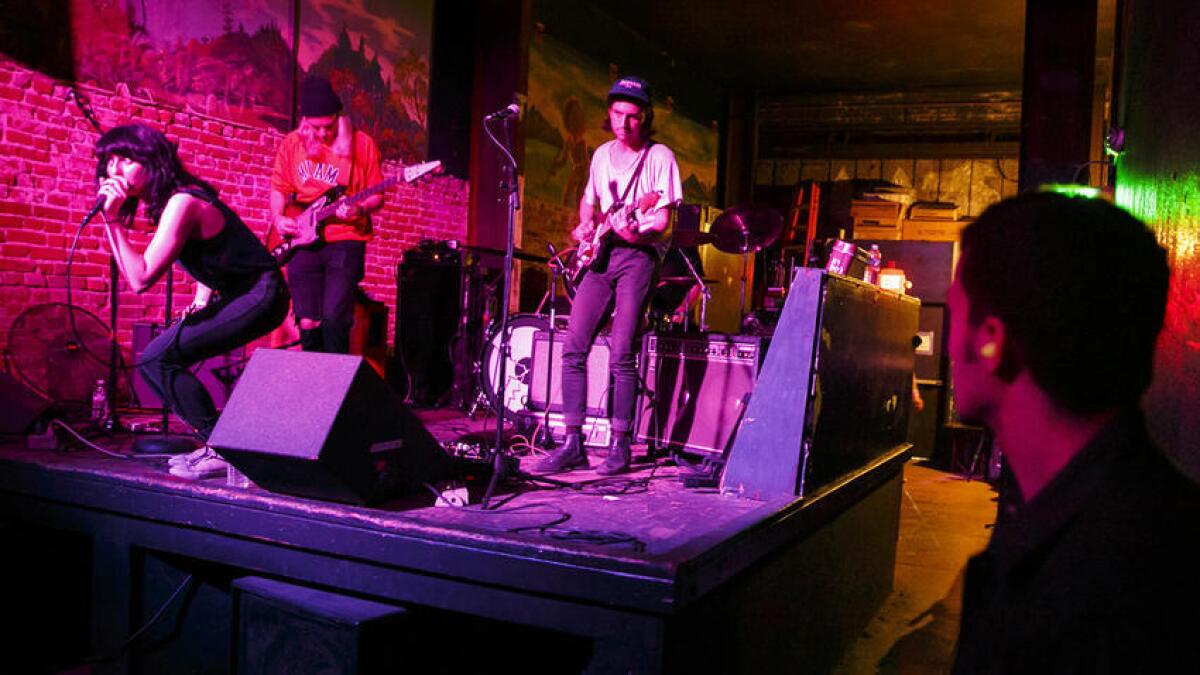
“We just wanted to keep that whole spirit alive,” he said. “That was our motivation. We didn’t expect it to last very long. We just wanted to keep it going until something better came along or someone else started something. But it just kept growing.”
The club moved to its current location less than two years later. Smith eventually assumed full ownership and started organizing a ragtag and noisy nighttime union to augment his daytime actions.
The Smell was described by Duzsik as “this ‘Village of the Damned’ Eastside noise scene where we could do anything we wanted.”
For Jennifer Clavin and her sister Jessica, both of the indie punk band Bleached, the club served as an essential portal. When they formed their early band Mika Miko, they played their first gigs at the Smell, and when they called it quits in late 2009, they did so with three farewell gigs at the club.
It gave us a place to freely present ourselves, our art, our music without feeling dictated or judged
— Jennifer Clavin of Bleached
“It gave us a place to freely present ourselves, our art, our music without feeling dictated or judged,” Jennifer wrote via email while on tour with Bleached in Europe. “Literally no other all ages spaces like that existed in L.A.”
Even so, the sisters were nervous sharing the Smell’s location with their parents.
Downtown Los Angeles was a different place when the sisters were driving in from the Valley. And maybe that was part of the appeal.
“Knowing you might get robbed walking to or from your car is what made getting inside the walls of the Smell feel like you earned it, and like you deserved to be there,” Jennifer wrote.
No Age’s Randall started hitting the Smell while it was still in North Hollywood. When he walked in he immediately felt at home. Previously, his experience with live performance had occurred at bigger venues like the Hollywood Palladium, the Palace (now Avalon) and Dodger Stadium.
At his first Smell gig, former Minutemen bassist Mike Watt played a set and Randall was upended by fans’ proximity to the artist. The summer before, he’d seen Watt at Lollapalooza.
“There was no stage,” he said. “There was no festival. There was no parking. There was no security. All the things that made performing live seem so distant and remote were eradicated.”
At the same time, stressed Randall, the Smell felt, and continues to feel, legitimate.
“It wasn’t like playing your friend’s backyard barbecue with your uncle embarrassing you and yelling at you to play songs. This was a real performance space that people took seriously, where real musicians performed.”
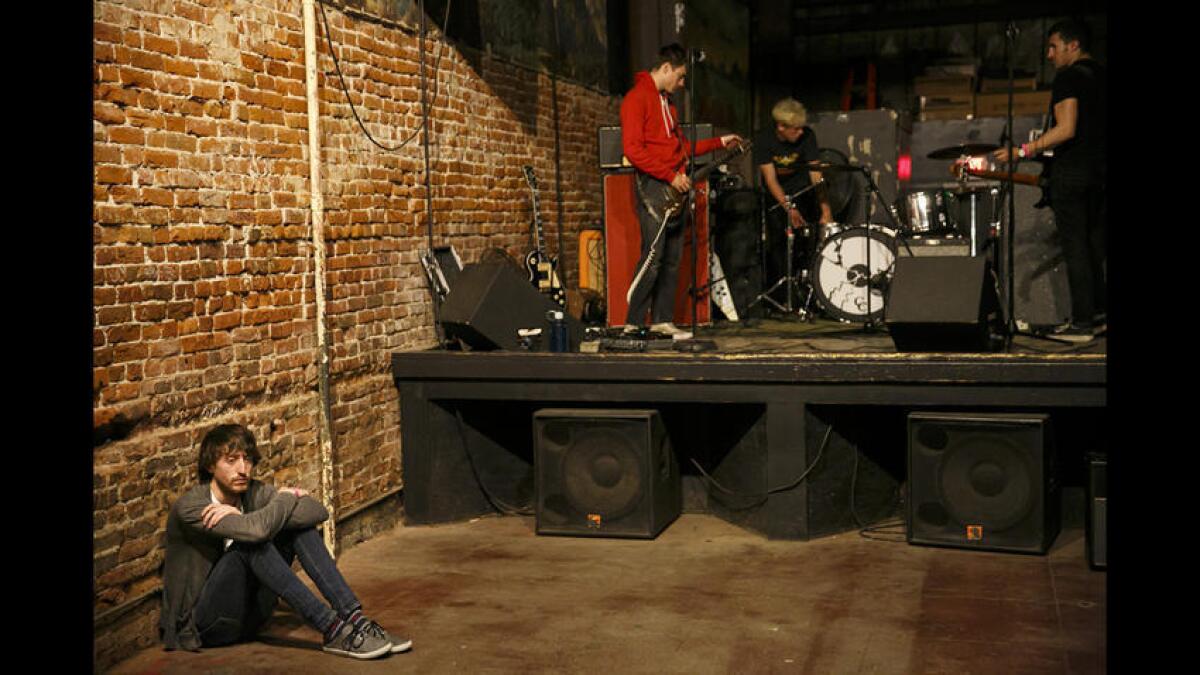
Health’s Duzsik said that tiny spaces like the Smell and CBGB inform the music. “We literally, specifically, made music to be played in the Smell. It was 30-foot-high ceilings, exposed brick walls. If you played big, tribal tom-toms, it sounded like ‘Mad Max’ in there. It sounded like the end of the world.”
And now some are worrying it’s the end of an era.
Last year Smith asked the building’s owners for a long-term lease. “They didn’t respond,” he said.
This time around he requested a short-term lease from Litwin, and if that wasn’t an option, assistance with relocating fees. According to Smith, Litwin promised to get back to him.
Whatever the short-term solution, it’s hard to see how the Smell’s situation in a changing downtown can be assured, a reality that even the most vocal Smell advocates acknowledge.
“You’d have to be stupid to not see what was happening downtown and think the Smell wasn’t part of a larger business plan for what downtown is becoming,” said No Age’s Randall.
“One day a huge fancy apartment building went up and that’s when we knew it was changing,” added Bleached’s Clavin.
Smith’s commitment to the space was hardly a shock either, even if Randall at first wondered whether Smith might take the news as a sign to move on.
“When and if he does want to go, he wants to do it at his time and under his own volition — not because somebody bought the building. That’s not a good enough reason for him to walk away from something that he’s dedicated the majority of his life to.
“A matter of commerce,” he said, “is not going to cause Jim Smith to recede into the shadows.”
Times staff writer August Brown contributed to this story.
What’s the best show you saw at the Smell? Share your memories in the comments section below >>
ALSO:
The Smell owner vows to save the all-ages punk club from shutting down
Drake, Brian Wilson and Blink-182: Your essential summer music guide
The Smell: A look at the bands that helped define the sound of the punk club
More to Read
The biggest entertainment stories
Get our big stories about Hollywood, film, television, music, arts, culture and more right in your inbox as soon as they publish.
You may occasionally receive promotional content from the Los Angeles Times.
